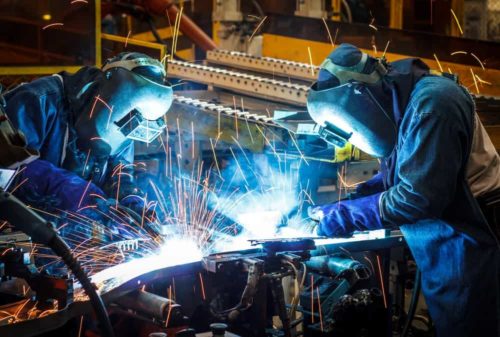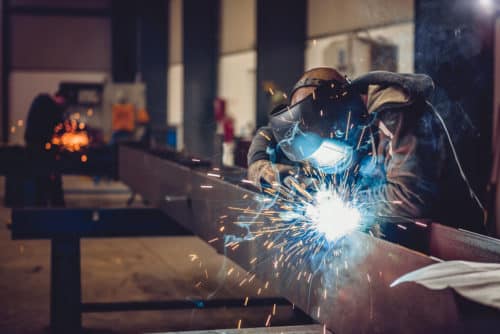Making a Case for an American Manufacturing Resurgence
With over 110 years in the precision metal fabrication business, G.E. Mathis Company has seen plenty of ups and downs in the manufacturing sector. As the third annual National Manufacturing Day recently rolled around, we’d like to take a moment to look at the state of manufacturing in America.
It’s been well-documented that manufacturing was on the decline for a few decades across the nation. Outsourcing of jobs, companies on the move, and a developing skill gap were all seem as part of the problem. Another issue that arose was the decline of students interested in the science, technology, engineering, and mathematics (STEM) fields.

The rebound of manufacturing is being helped at many levels. For example, the U.S. government has taken part by funding various manufacturing hubs, known as “Manufacturing Innovation Institutes.” These hubs aim to focus on particular fields of manufacturing and technology and to attract a new generation of workers.[1]
While we don’t know if manufacturing will ever reach its high points of the past, there are good signs that manufacturing will rebound and settle in to a steady period of development and innovation, spurred on by a new generation of bright, hardworking, innovative individuals. G.E. Mathis Company will do its part to spur the American manufacturing renaissance, and we hope you will too.
Bridging the Way through Manufacturing’s Skills Gap
As a long-time American manufacturer, we have seen manufacturing rise and fall, as well as rapidly change due to up-and-coming technologies. Today, we certainly see how American manufacturing is experiencing a renaissance, due to re-shoring and new technology that has been introduced into the production process. However, there is one looming issue that is poised to greatly affect manufacturing’s success—that would be the skills gap.

Manufacturing companies throughout America are finding a variety of ways to rectify this issue. For example, there are some local schools that are trying to start STEM programs, giving young students a solid background in science, technology, engineering, and math fields. The City of Chicago is partnering with Chicago Public Schools and other organizations to offer an education focused on technology and sciences, ensuring that students are prepared for future careers in STEM fields.
While the skills gap is a problem for the manufacturing industry, educational organizations and many companies are working tirelessly to prepare young workers for our modern, technical, and challenging workforce. We encourage younger generations to realize the skills and opportunity that lie in a manufacturing career, and we hope to see you on the production floor soon!
G.E. Mathis Company: A Diversification of Options
Diversification. What is diversification, and why is it so pertinent to us, here at G.E. Mathis Company?
To start, diversification is defined (by Merriam Webster) as a balance in industries or classes to a portfolio, or the increase in the variety of products offered. It is a word that has often described our company, due to the fact that we have not limited ourselves to one application, one fabrication process, or the production of one fabricated part. In fact, our long history has given us extensive experience and a vast portfolio.
What are some products we are skilled in fabricating?
Intermediate bulk containers (IBCs) for chemical applications and high quality components for OEMs in the construction, mining, defense, and agricultural industries.
What materials can we work with?
We work with a wide variety metals, from Carbon steels like A36, Gr-50, and Gr-80, to Stainless steels, to Abrasion-Resistant (AR) plate such as HARDOX® Wearplate, and high-strength steels such as A514 (T1) and STRENX® Performance Steel.

Everything from laser processing, high def plasma cutting with bevel capabilities, press brake forming, and welding.
What has enabled us to have such a diversified company?
There are many factors, including our lead times, ISO 9001:2015 quality standards, and our HARDOX® Wearparts membership. Our capabilities have expanded over the years, primarily because we continue to upgrade our equipment and focus on having the longest and most precise fabrication capabilities (for example, we can fabricate parts from 16 gauges to 2 in. thick!). We have continued to set our sights on improving our business and our capabilities. In other words, whatever it takes to get the job done right.














